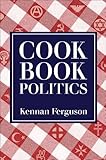Cookbook Politics / / Kennan Ferguson.
Material type: TextPublisher: Philadelphia : : University of Pennsylvania Press, [2020]Copyright date: ©2020Description: 1 online resource (184 p.)Content type:
TextPublisher: Philadelphia : : University of Pennsylvania Press, [2020]Copyright date: ©2020Description: 1 online resource (184 p.)Content type: - 9780812252262
- 9780812297126
- 641.5 23
- TX644
- online - DeGruyter
| Item type | Current library | Call number | URL | Status | Notes | Barcode | |
|---|---|---|---|---|---|---|---|
 eBook
eBook
|
Biblioteca "Angelicum" Pont. Univ. S.Tommaso d'Aquino Nuvola online | online - DeGruyter (Browse shelf(Opens below)) | Online access | Not for loan (Accesso limitato) | Accesso per gli utenti autorizzati / Access for authorized users | (dgr)9780812297126 |
Browsing Biblioteca "Angelicum" Pont. Univ. S.Tommaso d'Aquino shelves, Shelving location: Nuvola online Close shelf browser (Hides shelf browser)

|

|

|

|

|

|

|
||
| online - DeGruyter Your Whole Life : Beyond Childhood and Adulthood / / | online - DeGruyter The World That Fear Made : Slave Revolts and Conspiracy Scares in Early America / | online - DeGruyter Landscapes of Law : Practicing Sovereignty in Transnational Terrain / | online - DeGruyter Cookbook Politics / / | online - DeGruyter Sovereignty Suspended : Building the So-Called State / | online - DeGruyter Bank Notes and Shinplasters : The Rage for Paper Money in the Early Republic / | online - DeGruyter Migrant Citizenship : Race, Rights, and Reform in the U.S. Farm Labor Camp Program / |
Frontmatter -- CONTENTS -- INTRODUCTION -- 1. Democracy: The Recipe, the Cookbook, and the Forms of Politics -- 2. Nationalism: Why States Need Cookbooks -- 3. International Relations: Mastery, Sensibility, and Relational Cooking -- 4. Community: Cookbooks as Collectivity -- 5. Ideology: Food, Fast and Slow -- Conclusion: How Taste Matters -- Notes -- Index -- Acknowledgments
restricted access online access with authorization star
http://purl.org/coar/access_right/c_16ec
An original and eclectic view of cookbooks as political actsCookbooks are not political in conventional ways. They neither proclaim, as do manifestos, nor do they forbid, as do laws. They do not command agreement, as do arguments, and their stipulations often lack specificity - cook "until browned." Yet, as repositories of human taste, cookbooks transmit specific blends of flavor, texture, and nutrition across space and time. Cookbooks both form and reflect who we are. In Cookbook Politics, Kennan Ferguson explores the sensual and political implications of these repositories, demonstrating how they create nations, establish ideologies, shape international relations, and structure communities.Cookbook Politics argues that cookbooks highlight aspects of our lives we rarely recognize as political-taste, production, domesticity, collectivity, and imagination-and considers the ways in which cookbooks have or do politics, from the most overt to the most subtle. Cookbooks turn regional diversity into national unity, as Pellegrino Artusi's Science in the Kitchen and the Art of Eating Well did for Italy in 1891. Politically affiliated organizations compile and sell cookbooks-for example, the early United Nations published The World's Favorite Recipes. From the First Baptist Church of Midland, Tennessee's community cookbook, to Julia Child's Mastering the Art of French Cooking, to the Italian Futurists' proto-fascist guide to food preparation, Ferguson demonstrates how cookbooks mark desires and reveal social commitments: your table becomes a representation of who you are.Authoritative, yet flexible; collective, yet individualized; cooperative, yet personal-cookbooks invite participation, editing, and transformation. Created to convey flavor and taste across generations, communities, and nations, they enact the continuities and changes of social lives. Their functioning in the name of creativity and preparation-with readers happily consuming them in similar ways-makes cookbooks an exemplary model for democratic politics.
Mode of access: Internet via World Wide Web.
In English.
Description based on online resource; title from PDF title page (publisher's Web site, viewed 18. Sep 2023)


